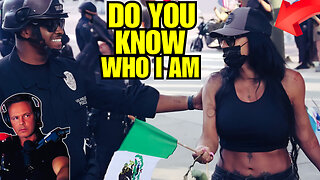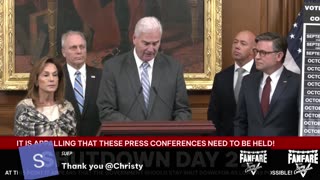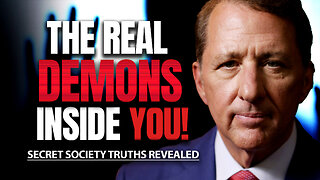Premium Only Content

Episode 3271: Abandonment to Divine Providence: Remove the Illusion of Control
www.catholic-reboot.com
Nightly Zoom Coordinates for Rosary:
Meeting ID: 865 8978 0399
Passcode: Wjjv4960!
Speak Lord for your Servant is Listening
Book Recommendation of the Day
St. John Eudes: The Kingdom of Jesus
• St. John Eudes (1601–1680), a great French missionary and founder of religious congregations, wrote this masterpiece where he unfolds the reign of Jesus Christ in the hearts of the faithful and in society. It is very much in line with the later papal teachings that culminated in Pope Pius XI’s encyclical Quas Primas (1925), which formally instituted the Feast of Christ the King.
• The book develops how Christ must reign in our souls, families, and nations, making it one of the strongest traditional works to prepare for and live the Feast of Christ the King.
Welcome back to our Traditional Catholic podcast, where we seek to reclaim timeless truths in a world caught up in endless distractions. Today we’re going to reflect on letting go of control. Many modern thinkers encourage control but the as Catholics we see it just the opposite. The fullness of peace and surrender is found only in Christ and in the mystery of Divine Providence.
Abandonment to Divine Providence: Remove the Illusion of Control.
There was a book written by Ray Bradberry called “Something Wicked this way comes” which was later turned into a movie in 1983. The theme of the movie is the devil comes to a small town under the guise of a carnival in order to seduce the souls of that town and has been doing it for many different generations. The name of the book came from Macbeth when the witch said “By the pricking of my thumbs, Something wicked this way comes: Open, locks, Whoever knocks!” The devil sets up a hall of mirrors that allows people to see what they fantacise and what they fantacise which is sinful because its their passions rather than Gods will is exactly what entraps them and makes them slaves to the devil.
The overall theme is The Danger of Illusion and the Truth of Surrender
A False Surrender
Many today encouraged the “art of letting go of control” by dissolving the self into the flow of life. This philosophy, lacks the anchor of objective truth in God. For many today surrender is about blending into impersonal forces nature, energy, the “river of life.” But without Christ, this surrender risks becoming fatalism: a passive acceptance that denies both the freedom of the will and the call to holiness.
From a Catholic perspective, we cannot simply “let go”. Our Lord teaches that surrender must be directed to the will of God, not to a nameless current. True peace comes from Christ’s words: “My yoke is sweet and My burden light” (Matthew 11:30).
A Warning Against False Control
In Something Wicked This Way Comes, Ray Bradbury offers a profoundly moral tale that resonates with Catholic truth. The carnival tempts souls by offering them control the ability to change time, escape age, or fulfill hidden desires. Yet this control comes at the price of bondage to evil.
Here we see the reality of Satan’s lies: he whispers that man can be “as gods” (Genesis 3:5), taking control of destiny apart from God. Bradbury’s protagonists, Will and his father, resist this temptation not by seizing control, but through joy, love, and childlike trust that echoes Our Lord’s command: “Unless you become as little children, you shall not enter the kingdom of heaven” (Matthew 18:3).
The Catholic Synthesis
Bradbury’s wisdom: He dramatizes the truth that evil ensnares us when we seek to dominate life instead of receiving it as a gift.
The Catholic truth: Both surrender and resistance must be ordered to Christ. We let go of self-will not into impersonal forces, but into the Providence of God. And we resist the false promises of Satan by clinging to faith, hope, and charity.
Where Society preaches an empty “letting go,” the Catholic knows that the true art of surrender is found in the Sacred Heart of Jesus: “Into Thy hands, O Lord, I commend my spirit” (Luke 23:46). And where Bradbury shows the horror of seeking control outside of God, the Church reminds us that true freedom comes not in power, but in holiness in abandoning ourselves to Divine Providence and resisting the carnival of lies with the weapons of prayer, the sacraments, and trust in Christ the King.
Segment 1: The Illusion of Control
Modern anxiety & control
We live in an age of obsession with control over schedules, careers, health, even the narrative of our lives. Technology promises mastery, and psychology often tells us we can shape reality through sheer willpower. But what happens when life refuses to bend to our plans? Fear. Panic. Despair.
Much of human suffering comes from clutching too tightly. Catholic teaching
Sacred Scripture makes this clear: “The heart of man plans his way, but the Lord establishes his steps” (Proverbs 16:9).
Control is not ours to keep. The illusion of self-sufficiency is part of the Fall: Adam and Eve grasped at autonomy, wanting to “be like gods” (Genesis 3:5). Every attempt to dominate our lives apart from God is a repeat of that rebellion.
Saintly perspective
St. Augustine teaches: “Our hearts are restless until they rest in Thee.” Restlessness is the fruit of seeking control outside God’s will.
Segment 2: Letting Go vs. Abandoning to Providence
Two paths of surrender
The secular “let go” is often passive drifting like a leaf in the river. Catholic abandonment is active: we place ourselves in God’s hands deliberately, in faith.
De Caussade’s teaching
Fr. Jean-Pierre de Caussade, in Abandonment to Divine Providence, wrote: “The will of God is manifested to us every moment, an immense ocean, which the heart only fathoms in proportion to its faith, love, and abandonment.”
Contrast with pantheism
Eastern philosophies, often implying the self merges with the flow of reality. Catholicism warns against this: creation is not God. We surrender not to a vague current but to a the living God who governs all things with love.
Scriptural anchor
Romans 8:28: “We know that all things work together for good for those who love God, who are called according to His purpose.” Abandonment is not drifting it’s trusting that every trial, every delay, every unexpected turn is permitted for our sanctification.
Segment 3: Christ’s Example of Surrender
The Agony in the Garden
Christ’s words in Gethsemane“Not my will, but Thine be done” (Luke 22:42) show the true art of surrender. He does not deny His human desire for relief, but places it beneath obedience to the Father.
True letting go is cruciform
Unlike philosophies that promise serenity through detachment, Christianity promises peace through the Cross. The Cross is not an escape but an embrace. St. Paul reminds us: “If we suffer with Him, we shall also reign with Him” (2 Timothy 2:12).
Mary’s fiat
The Blessed Virgin Mary embodies abandonment: “Be it done unto me according to thy word” (Luke 1:38). She let go of her own plans, entrusting herself to God’s designs even when those led her to the foot of the Cross.
Segment 4: Practical Catholic Ways to Abandon Control
Here are concrete practices to live this truth:
1. Morning Offering
Each day, consciously place your actions into God’s hands. “O Jesus, through the Immaculate Heart of Mary, I offer You my prayers, works, joys, and sufferings…”
2. Daily Rosary
Every bead is an act of trust. The mysteries show us how Christ and Our Lady surrendered perfectly to the Father.
3. Frequent Confession
Pride says “I am in control.” Confession breaks that lie. In kneeling before the priest, we confess dependence on grace.
4. Meditation on Scripture
Passages like Matthew 6 (“Consider the lilies”) remind us not to be consumed by tomorrow.
5. Accepting trials as gifts
St. Alphonsus Liguori: “Uniformity with the divine will is the shortest and surest way to holiness.” Trials are not accidents they are invitations to trust.
6. Silence before the Blessed Sacrament
Instead of trying to control God with words, sit before Him and allow His gaze to reorder your soul.
Segment 5: Warning Against False Surrender
Danger of dissolving into ‘the flow’
spoke of merging with life as if one were part of a cosmic unity. Catholicism affirms creation is ordered, but distinct from God. If we “let go” without anchoring in Him, we risk slipping into pantheism or relativism.
Discernment
True abandonment increases faith, hope, and charity. False surrender makes us passive, indifferent, and careless toward sin.
Spiritual warfare
The devil tempts us either to clutch too tightly or to let go into nothingness. The narrow path is surrender to Divine Providence.
Epistle: Colossians 1:12–20
"Giving thanks to God the Father, who hath made us worthy to be partakers of the lot of the saints in light... For in Him were all things created in heaven and on earth, visible and invisible... And He is the head of the body, the Church; who is the beginning, the firstborn from the dead, that in all things He may hold the primacy."
Reflection on the Epistle
St. Paul presents Christ as the center of creation and redemption. He is not simply one teacher among many, but the very one through whom all things were created, and in whom all things are reconciled. He is the visible image of the invisible God, the firstborn from the dead, and the head of the Church.
This passage is a declaration of Christ’s kingship. He is King not only by divine right but also by conquest through His Passion and Resurrection, He conquered sin and death.
For us, this means that acknowledging Christ’s kingship is not optional. To reject His authority in our lives, our families, or our nations is to reject the very order of creation itself. True liberty, true peace, and true justice come only under His reign.
Gospel – John 18:33–37
"Pilate therefore said to Him: Art Thou the King of the Jews? Jesus answered: My kingdom is not of this world... Pilate therefore said to Him: Art Thou a king then? Jesus answered: Thou sayest that I am a king. For this was I born, and for this came I into the world; that I should give testimony to the truth."
Reflection on the Gospel
Before Pilate, Christ affirms His kingship, even as He goes to the Cross. His kingdom is not “of this world” it does not originate from worldly power, armies, or politics but it does encompass this world, because it is rooted in divine truth.
Christ is not a political revolutionary, but neither is His kingship merely “spiritual” in the sense of being irrelevant to social order. His reign demands that families, societies, and governments acknowledge Him and submit to His law.
This Gospel reveals that Christ reigns through truth. The battle of our age is precisely over truth about life, marriage, morality, and God Himself. To deny Christ’s kingship is to embrace relativism and chaos, as we see all around us today.
Feast of the Kingship of Christ
The feast of Christ the King was instituted to reassert a forgotten truth: that Christ must reign over nations as well as individuals. Pope Pius XI warned that when states exclude Christ and His law, they open the door to tyranny, immorality, and war. His prophecy has come true in our own times.
The feast calls us not to retreat into a private faith but to publicly proclaim: Christus Rex! Christ must reign in our homes, in our schools, in our workplaces, and in our laws.
Application for Today
• Acknowledge Christ’s Kingship personally: Submit every part of your life to Him thoughts, actions, desires.
• Restore His Kingship in the family: Enthrone the Sacred Heart in your home, making Christ the true King of your household.
• Witness publicly: Do not be afraid to proclaim your faith in the public sphere, even when opposed.
• Pray for nations: That rulers may once again recognize their duty to God, for the peace and flourishing of society.
• Support the Traditional Liturgy: The old calendar preserves the true meaning of this feast, proclaiming Christ’s reign here and now not only at the end of time.
Conclusionary Prayer
O Lord Jesus Christ, King of Heaven and earth, we humbly ask Thee to reign over our minds by faith, over our hearts by charity, over our families by devotion, and over our nations by justice and truth.
Through the intercession of the Blessed Virgin Mary, Queen of Heaven, and all the saints, grant that we may live and die as faithful subjects of Thy reign, so that at the end of time we may be found worthy to reign with Thee forever.
Christ the King, reign over us!
Sacred Heart of Jesus, have mercy on us.
Immaculate Heart of Mary, intercede for us.
-
 1:12:02
1:12:02
vivafrei
2 hours agoThe Rise of Mamdami & the Fall of New York! Ice Activits ARRESTED! Ostrich Farm UPDATE! & More!
72.9K37 -
 16:31
16:31
Clintonjaws
5 hours agoICE Rioters Getting Arrested - This Is Priceless
4.07K5 -
 1:05:34
1:05:34
The Quartering
3 hours agoJob Economy Collapsing, Food Wars Start Friday & The War On Tucker Carlson
105K33 -
 LIVE
LIVE
Barry Cunningham
2 hours agoPRESIDENT TRUMP EVENTS IN SOUTH KOREA | MIKE JOHNSON SHUTDOWN DAY 29 PRESSER | MORE NEWS!
1,692 watching -
 LIVE
LIVE
The HotSeat
1 hour agoAmerican Politics Are Really NOT This HARD!!!!
602 watching -
 2:19:30
2:19:30
Side Scrollers Podcast
6 hours agoAngry Joe’s TDS/Halo Meltdown + Console War is OVER + Twitch Staff FIRED + More | Side Scrollers
45.6K9 -
 1:13:46
1:13:46
DeVory Darkins
4 hours agoDemocrat Voters get CRUSHING NEWS as Trump celebrates MAJOR TRADE DEAL
129K54 -
 14:54
14:54
The Kevin Trudeau Show Limitless
6 hours agoThe Hidden Force Running Your Life
14.6K6 -
 1:00:11
1:00:11
Mark Kaye
4 hours ago🔴 Joe Biden Autopen Scandal Update - Staff Paid MILLIONS To Keep Quiet!
26.4K4 -
 DVR
DVR
SternAmerican
1 day agoELECTION INTEGRITY CALL – WED, OCT 29 · 2 PM EST | FEATURING NEW JERSEY
17K